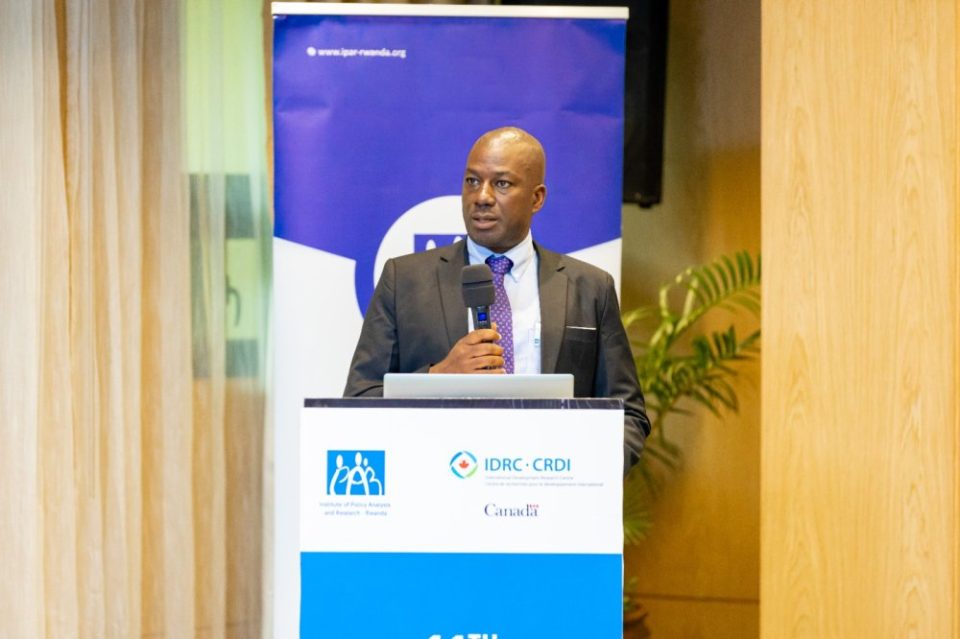Policymakers and concerned actors have been urged to recognize Unpaid Care Work (UCW) amid increased calls for reduction and redistribution of the huge burden shouldered by women in the society.
This comes in the wake of a recent survey by the Institute of Policy Analysis and Research (IPAR) Rwanda which shows that on average women spend 35.2 hours on UCW per week compared to 14.3 hours for men.
The study unveiled during the 11th annual research conference held at Kigali Marriot Hotel on Wednesday, March 27, indicates that women work more hours in a week (75.6/168) compared to 66.6/168 for men with men having more hours for leisure at 25.1 hours compared to 18.1 hours for women.
Speaking during the event, Dr Boaz Muhanguzi, the Director of Research at IPAR Rwanda, said the three-year study was carried out in the five districts of Rwanda including Rwamagana, Gicumbi, Burera, Musanze and Nyabihu with funding from International Development Research Centre (IDRC).
The survey focused on families with at least one dependent child under the age of 12 years living in the rural areas.
The research began in 2021 and was conducted in three phases. The full report expected in May this year.
Muhanguzi emphasized that UCW recognition should start at the household level and extend to the national level.
“We are saying there is a need for recognition of the burden of unpaid care work. At the household level, women are putting in a lot of work, but nowhere has it been recognized that women are contributing significantly to care work within our communities. Additionally, men have not acknowledged the extensive efforts of their wives. Through our sensitization programs, we are encouraging men to recognize the efforts made by women,” Muhanguzi said.
“I recommend thorough sensitization of men and women about gender masculinity. When we do this, we shall have many men coming on board to share the previous workload, which was primarily done by women, for example, childcare. Men will challenge traditional norms and cultural beliefs that dictate men should not babysit or enter the kitchen to cook. More men and boys will participate in tasks traditionally performed by women and girls,” he added.
Muhanguzi called on the government to enhance measures aimed at alleviating the burden on women, such as subsidizing new technologies that could reduce the time spent on UCW. This, he said, will improve access to commodities such as water.
To improve women’s involvement in national development, Muhanguzi also urged the private sector to put in place facilities such as day care centers for employees with young babies.
“This would be far better than a situation where this person has to stay at home after maternity leave due to a lack of childcare options,” he noted.
Several stakeholders attended the event presided over by Silas Ngayaboshya, the Director General for Gender Promotion and Women’s Empowerment.
Ngayaboshya said UCW should be seen as a result of gender inequalities and emphasized on the need to address the root cause of the inequalities.
He noted that due to UCW more women than men miss out on time to invest in paid work.
Ngayaboshya also pointed out that UCW should not be seen as a women’s issue but a societal problem that has far reaching consequences for instance in the care for children.
“If children are only cared for by women, that means men are losing the opportunity to socialize with their children. This has consequences not only for the children but also for men,” he said.
“Another study has revealed that men who invest in caring for children are likely to consume less alcohol. Dialogue between husbands and wives increases, and they are more likely to have better mental health. I think we should all recognize that these benefits everyone, and we should promote equitable redistribution of unpaid care work.”
Eugenia Kayitesi, the Executive Director of IPAR Rwanda, emphasized that the redistribution and reward of UCW will promote stability in Rwandan households, particularly in rural areas where the imbalance is significant.
Additionally, stakeholders called for the implementation of gender-responsive budgeting mechanisms to allocate resources specifically for addressing Unpaid Care Work (UCW).
Other interventions sought include the recognition of the contribution of unpaid care work in the national GDP, enactment of laws that protect the rights of caregivers in both the formal and informal sectors, and ensuring meaningful representation of women in national and local decision-making forums. – IGIHE


